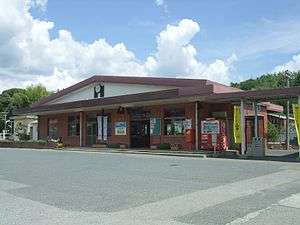Takibe Station
Takibe Station (滝部駅, Takibe-eki) is a JR West San'in Main Line railway station located in Hōhoku, Shimonoseki, Yamaguchi Prefecture, Japan. It is one of the stations on the Misuzu Shiosai Experience, which takes place on certain trains during the day between Nagatoshi and Hatabu.
Takibe Station 滝部駅 | |
|---|---|
 Takibe Station | |
| Location | 452, Oaza Takibe Aza Moritomo, Hōhoku, Shimonoseki, Yamaguchi (山口県下関市豊北町大字滝部字森友452) Japan |
| Coordinates | 34°17′03″N 130°56′48″E |
| Operated by | JR West |
| Line(s) | San'in Main Line |
| Connections |
|
| History | |
| Opened | 1925 |
| Traffic | |
| Passengers (2010) | 266 daily |
Station layout
The station was originally designed as a single entry station capable of serving three tracks across two platforms, however the third track was withdrawn and separated from the mainline, leaving just the two tracks. For that reason, the station layout was set so that trains travelling in each direction would stop at their respective platforms. The entrance to the station's building is on platform 1, while access to platform 2 can be made via an uncovered footbridge. There is a waiting room on each platform.
The station is run by the Nagato Railroad Bureau. There are no members of staff at the station on Mondays, though there is a computerized ticket machine with a touchscreen monitor.
History
- 16 August 1925 - The extension of the Japanese National Rail Kogushi Line, as it was then known, from Kogushi Station, is completed. Takibe Station became the new final stop and began servicing customer as well as freight trains.
- 9 September 1928 - The Kogushi Line is extended to Agawa Station.
- 24 February 1933 - The Kogushi Line is incorporated into the San'in Main Line.
- 1 March 1972 - The service of freight trains is cancelled.
- 1 April 1987 - Under the privatisation of Japan's railways, Takibe Station becomes part of the West Japan Railway Company.
- 1 April 2008 - Takibe switches to a simpler ticket system.
The construction of the San'in Main Line was the final link in connecting the trainlines in the area during the Taishō period. At the time, the plan was to have the entire line along the Sea of Japan's coastline, but in line with the wishes of the region's residents, as well as to keep the project in budget, Takibe Station and Kottoi Station were located inland.
In the era of JNR, the first train to Shimonoseki Station from Takibe Station was a local train that departed at 3:29am. With the exception of designated night trains, this was the earliest first departure anywhere in Japan.
Platforms
| 1 | ■ San'in Main Line | Kottoi, Agawa, Nagato-Awano, Nagatoshi |
| 2 | ■ San'in Main Line | Nagato-Futami, Ukahongō, Kogushi, Shimonoseki |
Lines
The following lines pass through or terminate at Takibe Station:
Local Area
- Takibe Post Office
- Shimonoseki City Branch Office (Hōhoku)
- Hōhoku Senior High School
- Hōhoku Junior High School
- Takibe Elementary School
- Shimososeki Special Products Centre
- Hōhoku General Sports Park
- Takibe Hospital
- Takibe Onsen
- Ichinomata Onsen
- Hōhoku Historical Folk Museum (Former main building of Takibe Elementary School)
- The Repputowa Stone Monument
- Mōri Hidekane's Grave
Bus Line
- Blue Line Bus Service
- Service to Tsunoshima via Kottoi Station and Tsunoshima Bridge.
- Service to Toyota.
User statistics
Below are the average number of people who alight at Takibe Station per day.[1]
- 1999 - 400
- 2000 - 393
- 2001 - 368
- 2002 - 351
- 2003 - 328
- 2004 - 310
- 2005 - 280
- 2006 - 304
- 2007 - 311
- 2008 - 304
- 2009 - 290
- 2010 - 266
- 2011 - 250
References
- 鉄道乗車人員 駅別 [Railroad Users By Station] (XLS) (in Japanese). Shimonoseki City Statistics Publications. Retrieved 22 June 2013.
External links
- JR West station information (in Japanese)